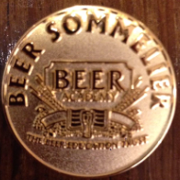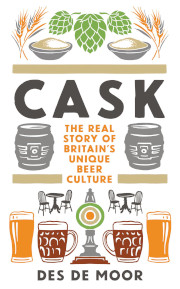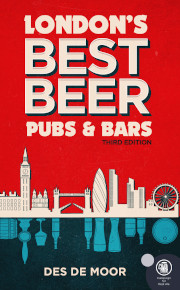ABV: 5.6%
Origin: Masham, North Yorkshire, England
Website: www.theakstons.co.uk

Theakston Old Peculier
Theakston Old Peculier is a stalwart icon of British real ale. Back in the 1970s it was the sort of beer enthusiasts discussed in hushed and reverential tones, with a pedigree dating back to the 1890s, appreciated not only for its quality but for its heritage as one of the few surviving examples of what appeared to be the fast disappearing traditional style of old ale.
And then there was that wonderful, evocative name with its aberrant spelling, the sort of name a roomful of brainstorming marketeers wouldn’t have come up with in a month of focus groups, but which seemed to connote a whole value system for the real ale movement. Inevitably it became the target first of homage then of parody and ridicule.
In fact the name refers not to the beer but to the Peculier of Masham, a mediaeval adminstrative arrangement under which the brewery’s home town was a theocracy, exempt from secular law. The town, in the Yorkshire Dales, was once an important brewing centre, and Theakston is the sole surviving historic brewery –Masham’s second brewery, Black Sheep, is a new wave establishment presided over by a prodigal member of the Theakston family. Theakston is also remarkable as one of the few independents to emerge intact from an entanglement with a multinational: between 1987 and 2004 it was owned by Scottish & Newcastle (now Heineken) but then the family bought it back.
Theakston’s most famous product is brewed from pale and crystal malts, maize, Challenger, Fuggles and Goldings hops, cane sugar and caramel, emerging a dark amber brown colour with a little off-white head. The aroma is malty and treacly with big estery fruit and a cinder toffee whiff. A sweet fruit cake palate is lifted by estery fruit and roast notes, while a soft and lightly cleansing swallow leads to a long and complex finish that turns surprisingly dry after a sweetish start, with chewy vegetal hops over soft malt and a late note of brown sugar. Overall it’s a big and satisfying beer.
I hadn’t tasted Old Peculier for some years — these days I’m usually drinking a beer new to me — but spotting it on offer at the 2009 National Winter Ales Festival in Manchester, alongside a plethora of upstart micros, I took the opportunity to update my tasting notes by revisiting an old friend. I’m delighted to report that, in the age of myriad micros both revivalist and inventive, where things old and peculiar are thankfully no longer so central to the ideology of beer appreciation, Old Peculier still stands up very well indeed. In top condition, the cask version remains a benchmark of the style.
Read more about this beer at ratebeer.com: http://www.ratebeer.com/beer/theakston-old-peculier-cask/44739/





what was the original abv of old pec?
it wasn’t 5.6%
In the 1977 Good Beer Guide it’s listed with an original gravity of 1060.3, so it probably ended up about 6%. Whether that was the original ABV when it was first brewed I don’t know — I suspect not, as it dates back to 1890 when gravities were generally higher than they are today, and may even have its roots in old ales that were brewed by the Theakstons long before that.
I seem to remember the ABV to be in the seven point something range. That was in about 1981. That was a long time ago and I have a few less brain cells now.
I could have sworn the ABV used to be more in, say, 1976-80, than it is now. A friend once commented to me that it was so strong that it should be classified as a barley wine. I was going to say that now it’s only a little stronger than Ruddles County, but that ale ALSO appears to be less strong than I remember it! (Yes I know Greene King took over – they should have stuck with Abbot!)
I remember drinking OP in the 1990’s, I am sure it was as north of 7%. I remember a sweeter, fuller bodied beer than what you get now, more of an imperial stout consistency.
I remember drinking OP in the mid 70’s and it was stronger than it is now. It had a distinctive Barley Wine taste but only to a minor effect. I think the strength was around the 7% mark. However, I enjoy the modern drink better than the one I had in the 70’s.
I too have this recollection, but have no proof to back up my belief. At 5.6% it is not as powerful as the hushed tones of history would suggest.